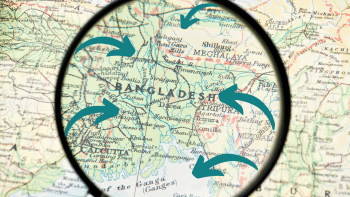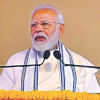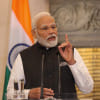Has Modi sounded the 2024 poll bugle?

The next round of general elections in India are less than two years away. But the rumblings of the next battle seem to have been sounded by Prime Minister Narendra Modi in his speech from the ramparts of the Red Fort in Delhi, on the occasion of Independence Day on August 15.
The nearly 90-minute speech stood out for its political content more than anything else. There was no announcement of any social welfare scheme or initiative, nor any major policy. Instead, Modi flagged three main issues – corruption, nepotism in politics and institutions, and women's empowerment – in a big way, setting the template of his campaign strategy for 2024 Lok Sabha polls. Along with these issues was the contour of a development vision for India in the next 25 years, when independent India will turn 100.
Modi framed his campaign theme involving three key constituencies of the Indian electorate: youth (pointedly appealing to them to help him fight graft and dynasticism), women, and a development agenda that will strike a chord with the youth today who will be on the cusp of middle age by 2047. He spoke in detail on how corruption was like termites, eating into the vitals of common people's lives, and that a time has come for launching a decisive battle against the menace. The crux of his remarks about nepotism is that it is present in politics, but also in the country's institutions. He wove in nepotism as a component of the bigger fight against graft because it frustrates the aspirational youth, forcing some of them to resort to corruption to get jobs.
The Indian prime minister left little doubt that corruption would be one of the mainstays of his campaign against his political rivals in the run-up to the 2024 general election. Without mentioning the finding of heaps of currency notes and gold during the Enforcement Directorate's recent raid on the premises of West Bengal's former minister Partha Chatterjee's close aide Arpita Mukherjee in Kolkata, Modi said while the Indian people were fighting poverty and struggling to arrange shelters for themselves, there are some people who have stolen so much that they don't find enough place to hide them.

He said it is a matter of concern that while there is general disdain against corruption across the country, at times certain indulgence is also seen towards the corrupt. Modi said some people have reached such a level of shamelessness that they glorify people who have been convicted by court for corruption and are spending time in prison. He pointed out how some individuals plundered crores of rupees from state-owned banks and ran away during the rule of previous governments, and said his government was trying to recover that money by raiding their properties.
Modi's remarks on graft came with the backdrop of Congress interim President Sonia Gandhi and her son Rahul Gandhi's questioning by the Enforcement Directorate for days in connection to alleged money laundering, and the main opposition party's street protests across India protesting their interrogation. Modi is no doubt trying to tap into the growing resentment against the unedifying spectacle of an entire party apparatus being mobilised in support of the leaders facing questioning in connection with alleged corruption.
Modi apparently also had at the back of his mind the mounting public anger against the recovery of 500 million rupees in cash at Arpita Mukherjee's flats in Kolkata and the arrest of another Trinamool Congress (TMC) strongman Anubrata Mandal, the party's Birbhum district president, by the Central Bureau of Investigation (CBI) in connection with cattle smuggling along the border with Bangladesh. But it's not just Congress or TMC whose leaders are at the receiving end of anti-corruption investigations. A number of leaders of important regional outfits like Aam Aadmi Party, Nationalist Congress Party and Shiv Sena, BJP's former ally in Maharashtra, are also behind bars for their alleged involvement in money laundering.
Modi's reference to graft and to the need for viewing the corrupt with contempt – the second one is a new framing in the fight against corruption – clearly indicates his determination to press ahead with probes into graft cases in the days to come. He knows that he has to keep an unwavering focus on the issue of corruption – not just by words, but by actions too.
That should throw a big challenge to the anti-BJP parties, national or regional, to find a more cogent answer than the repeated cry of "political vendetta" by the Modi government. The opposition must answer if the anti-graft probes against their leaders, many of which are mandated by courts, should be allowed to proceed. TMC is also struggling to deal with its divergent stands on the issue of corruption. While the party appears to have distanced itself from Partha Chatterjee, it has extended full-throated support to Anubrata Mandal, with Mamata Banerjee leading from the front with her remark that "if one Keshto (nickname of Mandal) goes to jail, thousands of Keshtos will be born."
Modi's talk against corruption is nothing new. He did it successfully in the run-up to the 2014 general election, which brought him to power for the first time as the prime minister, against the backdrop of allegations of a major scam in the allocation of 2G telecom spectrum. This time, one cannot help but notice the unambiguous political overtones in his flagging graft as a major challenge at a time when several opposition politicians are facing anti-graft investigations. What has come as an additional boost to the anti-corruption drive is the Supreme Court's recent upholding of the tough law against money laundering. The opposition has criticised the apex court's ruling.
By choosing corruption as a key campaign plank, Modi seems ready to hit the opposition where it will potentially hurt the most. He appears convinced that corruption and nepotism will once again resonate with the electorate and drown the opposition's charge against his government of "mismanagement" of the economy and creation of polarised narratives. After listening to Modi's latest Independence Day address to the nation, one is left with the inescapable conclusion that he may have sounded the bugle for the 2024 battle.
Pallab Bhattacharya is a special correspondent for The Daily Star. He writes from New Delhi, India.

 For all latest news, follow The Daily Star's Google News channel.
For all latest news, follow The Daily Star's Google News channel. 








Comments